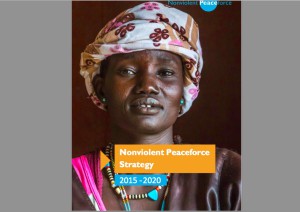EDUCATION FOR PEACE .
Excerpts from the strategy document of the Nonviolent Peaceforce
Nonviolent Peaceforce is a global civil society organisation. We protect civilians in violent conflicts through unarmed strategies. We build peace side by side with local communities. We advocate for the wider adoption of these approaches to safeguard human lives and dignity. [See CPNN articles about their work in South Sudan, Philippines, Ukraine, Syria, and Myanmar].

Unarmed Civilian Protection (UCP) is a proven way to reduce violence before, during, and after armed conflict; the effectiveness stems from providing direct physical protection, while empowering local peace processes and infrastructures. Unlike traditional military peacekeeping or armed private security firms, there is no reliance on weapons; this paradigm uses relationships rather than threat.
To increase our impact, we have two mutually reinforcing strategic aims for the next five years:
• Enhance protection for civilians in armed conflicts and strengthen local peace processes. We will expand our programme implementation by increasing field activities, enhancing civilian participation in peace processes, and building local protection capacities.
• Mainstream UCP policy and practices as an effective response to violent conflicts. We will step up our advocacy to advance unarmed civilian protection by influencing decision makers, advancing the methodology, and promoting greater adoption of unarmed civilian protection by others across the world stage.
Nonviolent Peaceforce is endorsed by many world leaders, from Nobel Peace Laureates to heads of state, such as Justin Trudeau, Rigoberta Menchú, Desmond Tutu, Jose Ramos Horta, Oscar Arias Sánchez, Lech Wałęsa and the Dalai Lama. They believe that our approach offers an innovative and effective solution to civilian protection and conflict transformation. In June 2015, the High-level Independent Panel on United Nations Peace Operations, commissioned by the United Nations Secretary General, concluded that “Unarmed strategies must be at the forefront of UN efforts to protect civilians.”(United Nations, 2015, p. 23)
Vision
We envision a worldwide culture of peace in which conflicts within and between communities and countries are managed through nonviolent means.
Mission
We protect civilians in violent conflicts through unarmed strategies. We build peace side by side with local communities. We advocate for the wider adoption of these approaches to safeguard human lives and dignity.
(Article continued in the right column)
Can peace be guaranteed through nonviolent means?
(Article continued from the left column)
Guiding Principles
* Nonviolence: We believe nonviolence is the strongest and most effective force for achieving the peaceful settlement of conflicts. We will not engage in nor support actions which may result in harm or loss of life. NP’s adherence to nonviolence is unconditional, because it asserts that conflict transformation cannot be achieved by violent means.
* Non-partisanship: We do not take sides nor advocate for partisan positions in any conflict. Instead, we are guided by international laws and norms, including International Humanitarian Law, Refugee Law, Human Rights Law, and relevant UN Resolutions. We are committed to the dignity, human security, and well-being of all and are independent from any interest group, political party, ideology or religion.
* Primacy of local actors: We facilitate and create safer spaces for local actors to work out their own solutions to their problems.
* Civilian-to-civilian action: We employ civilians to protect civilians in communities affected by violent conflicts.
Approach
Unarmed Civilian Protection (UCP) is a strategic mix of key principles, sources of guidance, and a set of methods with specific skills. Applied together, they constitute the core of UCP (see figure below). UCP is the practice of deploying professionally-trained unarmed civilians before, during, and after violent conflict to prevent or reduce violence, provide direct physical protection to non-combatants, and strengthen local peace infrastructures. Unlike traditional military peacekeeping or armed private security firms, with UCP there is no reliance on weapons; this paradigm uses relationships rather than threat.
Over the past 12 years, Nonviolent Peaceforce has developed and field-tested unarmed civilian protection techniques, which are based on four main methods: proactive engagement, monitoring, relationship building, and capacity development. Each of these methods has a number of applications as detailed in the graphic [see original article]. Frequently, UCP methods and applications are used in a dynamic interaction, reinforcing and complementing each other. Actual implementation activities are based on specific context, conflict analysis, and risk assessment.
By creating networks of relationships, strengthening self-protection strategies, developing local peace infrastructures, and creating safe spaces for civilians to address urgent issues, UCP broadens the options for civilians to choose their own security priorities.
NP’s civilian teams are diverse and comprised of staff from the violence-affected communities as well as from outside. All NP personnel are rigorously trained in the tools and strategies of unarmed civilian protection. They are committed to a code of conduct focused on mutual respect, equity, and non-discrimination. NP works in partnership with local communities, organisations, and complementary international organisations to create locally owned, sustainable solutions that protect and support civilians struggling to survive in conflict zones.
Nonviolent Peaceforce (NP) was formed during the decade of the Culture of Peace and Nonviolence for the Children of the World. Ambassador Anwarul Chowdhury as well as many others in the Culture of Peace Network contributed time, energy, talent and advice to the formation of NP. Strategic and well trained unarmed civilians protecting people in war zones are one of the positive manifestations of the Culture of Peace.